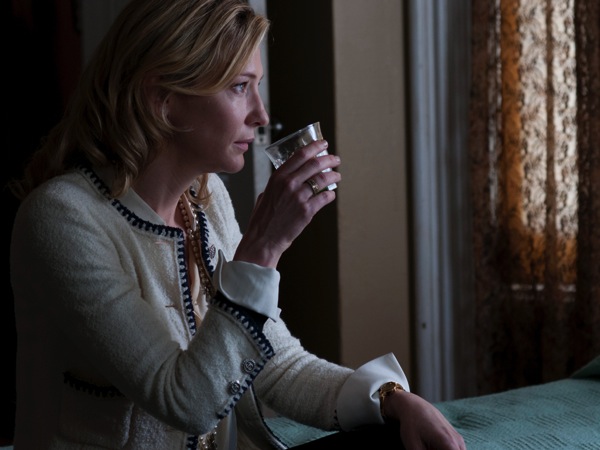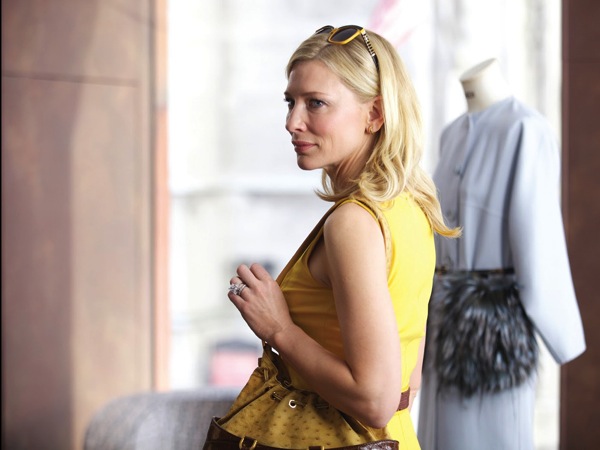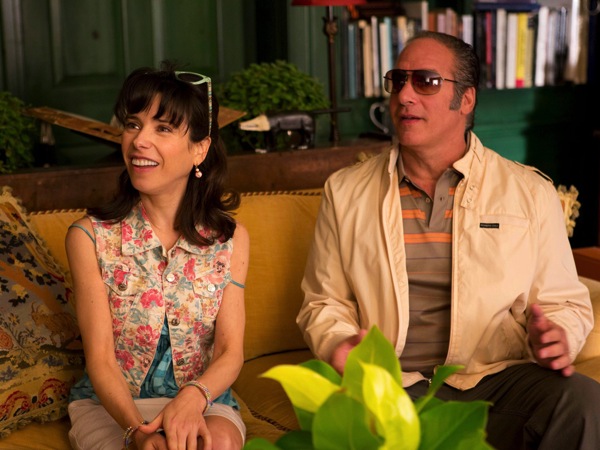 Cate Blanchett in Blue Jasmine; © Gravier Productions, Inc./Warner Bros., 2013. Used by permission.
Cate Blanchett in Blue Jasmine; © Gravier Productions, Inc./Warner Bros., 2013. Used by permission.
I’m running the Keswick Unconventional Film Club at the Keswick Convention this week. It’s the first time we’ve run it, though we did have a one-off film discussion one wet afternoon last year. I’m planning to write a brief blog each day about the films we’re watching and discussing together. Our first film was Woody Allen’s Blue Jasmine.
Woody Allen’s best films have always combined both humour and a bleak view of reality. Think, for example, of Crimes and Misdemeanors (1989) or even Annie Hall (1977). Blue Jasmine is, for my money, one of his Allen best (though this article shows that every one of his films back to 1993 has been hailed as a return to form by some critic of other). So there is plenty of humour, but it’s the bleakness which makes the bigger impression – not so much the bleakness of life generally, but of one life in particular.
The life in question is that of the title character, who is played to perfection by Cate Blanchett (a deserving Oscar and BAFTA winner, though personally I’d have liked Judi Dench to win). Jasmine had everything – or so it seemed. Her devoted husband, Hal (Alec Baldwin), was an extremely successful businessman, and she enjoyed a luxurious lifestyle among New York’s upper classes. But this glittering edifice was built on sand: Hal’s financial dealings were fraudulent and his devotion to Jasmine was a sham. When it all fell apart and Hal was arrested, she lost everything – homes, jewellery, friends, husband, step-son – and had to resort to moving to stay with her working-class sister, Ginger (Sally Hawkins), in San Francisco.
Jasmine feels the loss of both wealth and status acutely, and can hardly bear the thought of ending up living like her common sister. She has managed to hang on to some of her glamorous wardrobe and a few items of jewellery, as well as her set of Louis Vuitton luggage, and she flies first class, despite the exorbitant cost. She dream of reinventing herself, but with no skills or qualifications to speak of, other than a good eye for style and design, the path to rejoining the wealthy social set will not be easy.
 Cate Blanchett in Blue Jasmine. © Gravier Productions, Inc./Warner Bros., 2013. Used by permission.
Cate Blanchett in Blue Jasmine. © Gravier Productions, Inc./Warner Bros., 2013. Used by permission.
Her mental state is fragile and she relies heavily on Stoli Martinis and Xanax to control her anxiety. Throughout the film, she keeps thinking back to the life she has lost – both to all the beautiful things that she laments losing, and to the rottenness that she refused to see, though it was staring her in the face. She cannot let go of the idea of being wealthy, and repeatedly lies to hide the facts of her reduced circumstances. It’s a strategy doomed to fail.
Several other characters also practice deception at some point or other. It always has negative consequences, but it’s debatable whether Allen is suggesting that honesty is the best policy, or that the problem is being found out. In many ways, Blue Jasmine feels like a morality tale, but given Woody Allen’s views about the meaninglessness of the universe, perhaps it isn’t.
Is deception Jasmine’s fundamental problem, or is it her desperation for wealth? In her case, at least, the two are intertwined. As the apostle Paul says in his first letter to Timothy, ‘the love of money is a root of all kinds of evil’ (1 Timothy 6:10). The love of money corrupted Hal; the desire to make an easy profit prompted Ginger and her then-husband Augie (Andrew Dice Clay) to hand over their lottery winnings to Hal rather than invest it in an honest business.
 Sally Hawkins and Andrew Dice Clay in Blue Jasmine. © Gravier Productions, Inc./Warner Bros., 2013. Used by permission.
Sally Hawkins and Andrew Dice Clay in Blue Jasmine. © Gravier Productions, Inc./Warner Bros., 2013. Used by permission.
Jesus said some strong things about the dangers of wealth. When someone asked him to tell his brother to divide up their inheritance, Jesus told a parable about a rich man who had an abundant harvest. He decided to pull down his barns so he could build bigger ones in which to store his surplus. Then he would be able to ‘take life easy; eat, drink and be merry’. But, says Jesus, ’God said to [the man], ‘You fool! This very night your life will be demanded from you. Then who will get what you have prepared for yourself? This is how it will be with whoever stores up things for themselves but is not rich towards God’ (Luke 12:13–21).
Jasmine yearns to once again take life easy, eat, drink and be merry. Instead, she struggles through life, drinks too much and is full of anxiety. What hope is there for her life, with her deteriorating mental health and lack of anyone to love her, other than Ginger?I take soporific Ambien seldom, I think it should be so. Her life is a tragedy because of her addiction to wealth and status, despite no longer having them.
Jesus advised a rich young man that the one thing he still needed to do in order to get right with God was to get rid of all his wealth and give it to the poor (Mark 10:17–30). The young man wouldn’t do it. Like Jasmine, he couldn’t imagine leading a good life without wealth. Jesus observed, ‘How hard it is for the rich to enter the kingdom of God! … It is easier for a camel to go through the eye of a needle than for someone who is rich to enter the kingdom of God.’ Wealth blinds us to our need for rescue. If Jasmine was ever to recognise that all this world’s means of support had proved themselves inadequate, she might find herself in a place where turning to God would finally make sense.